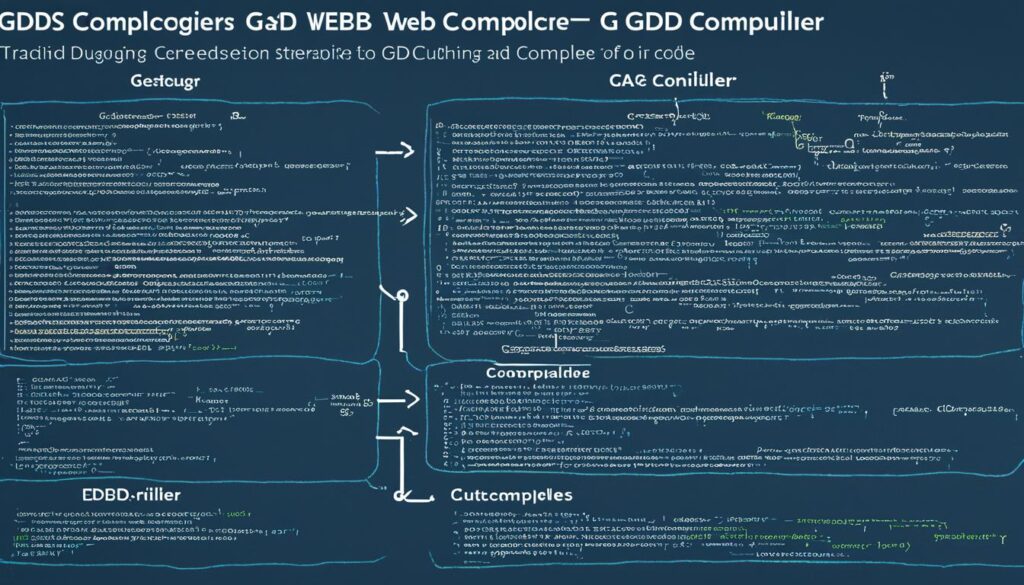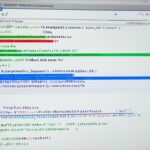Have you ever thought about how developers work from anywhere in the world? Today, being flexible and efficient is key. The online gdb compiler has changed everything. Now, we can use powerful tools to compile and debug code from anywhere.
This article will look at how online compilers have evolved. We’ll see how they let us debug code online easily and improve our projects.
Introduction to GDB Compilers
GDB, or GNU Debugger, is a key tool for developers. It helps find and fix bugs in languages like C and C++. It has changed from a desktop tool to an online platform, making debugging easier for more people.
Learning about GDB compilers will deepen our understanding of these tools. They include the gdb ide and gdb web compiler, which make debugging easier and more efficient. We’ll look into their main features and see why moving to online is beneficial.
Why Choose an Online GDB Compiler?

Choosing an online GDB compiler has many benefits that make coding easier. The interface is simple, making debugging straightforward. This means we can start coding quickly without wasting time on setup.
These tools are also easy to access from anywhere with internet. This means we can work from different places without worrying about compatibility issues. It makes it easy for teams to work together, sharing ideas and code instantly.
Starting projects is fast with an online GDB compiler. We don’t have to download software or worry about updates. This lets us get immediate feedback on our code, making coding more interactive.
Web-based GDB also makes teamwork easier. We can invite team members to join our projects for real-time reviews and solving problems together. This creates a community among developers, sharing knowledge and ideas.
Key Features of a Web-Based GDB
Web-based GDB compilers have key features that make coding better. They help us work more efficiently and improve our workflow.
Remote Access and Convenience
The main perk of web-based GDB is remote access. We can work from anywhere with a good internet connection. This means we can keep moving forward on projects without being stuck at one spot.
This is super useful for teams spread out across different places. With remote GDB, sharing code and getting feedback in real-time is easy. This makes the development process smoother.
Cross-Platform Compatibility
Web-based GDB also supports many operating systems like Windows, macOS, and Linux. So, we don’t run into problems because of system differences. This lets us work with our code easily, no matter the device we’re using.
Using cross-platform tools helps our team work together better. Everyone can access the same tools, making sure we’re all on the same page.
How to Use an Online GDB Compiler

Using an online GDB compiler makes coding and debugging easier. First, we log into the platform by creating an account. Many online GDB editors let us sign in easily with single sign-on.
Once in, we can start a new project quickly. To write our code, we use the integrated editor. It looks like traditional IDEs but has online-specific features like syntax highlighting and error checks.
After writing, running our code is just a click away. Online GDB compilers support many programming languages. This makes them versatile for various projects.
Managing our files and projects is easy. We can save our work, put files in folders, and go back to previous projects without losing anything. The online GDB editor has tools for finding errors in our code. This makes debugging simpler, even for beginners.
In summary, using an online GDB compiler involves logging in, starting and managing projects, writing and running code, and using debugging tools. These features make coding efficient for both new and experienced programmers.
Benefits of Debugging Code Online
Debugging code online has many advantages that make our programming work better. Being able to debug code online helps us find and fix errors quickly. This makes our work more efficient. Let’s look at these benefits to see how online debugging tools help us.
Real-Time Error Detection
Online debugging tools are great at finding errors as we write code. This means we can spot bugs right away. Catching errors early helps us keep our code top-notch. It lets us fix problems immediately, avoiding delays later on.
Collaborative Coding Environment
Working together on online GDB platforms makes teamwork and innovation better. We can all work on the code at the same time. This teamwork speeds up solving problems and shares knowledge, making us all better coders. Using online debugging tools helps us work together more effectively.
| Benefit | Description |
|---|---|
| Real-Time Error Detection | Identifies bugs immediately, improving coding efficiency. |
| Collaborative Environment | Enables multiple users to work on code together, fostering teamwork. |
| Enhanced Learning | Promotes knowledge sharing among team members, enhancing skills. |
| Accessibility | Allows coding and debugging from any location with internet access. |
Online GDB Compiler: A Comprehensive Guide

In this guide, we’ll learn how to use an online GDB compiler. We’ll start by setting up our online Integrated Development Environment (IDE) and getting familiar with its interface. This makes us ready to learn the basic commands needed for GDB, especially online.
Setting Up Your Online IDE
Creating an account with an online GDB editor is quick. After signing up, we can log in and start using our development environment right away. Here are the steps to set up:
- Visit the online GDB editor website.
- Click on the registration option and fill out the necessary details.
- Verify your email if required.
- Log in to your account.
- Get to know the UI, focusing on file management, console output, and debugging tools.
Basic Commands and Functionality
Knowing the basic commands in the GDB IDE is key for debugging. Here’s a table with some important commands, what they do, and how they differ online versus traditional setups:
| Command | Function | Online GDB Editor | Traditional IDE |
|---|---|---|---|
| run | Starts the program. | Executed directly in console. | Available via run menu. |
| break | Sets a breakpoint at a specified line. | Input in console after selecting the file. | Graphically set using the interface. |
| next | Steps over to the next line of code. | Executed in console while debugging. | Used in debugger menu. |
| Displays variable values. | Output shows directly in the console. | Inserts values in variable watch. |
Mastering these commands in our online GDB editor boosts our coding and debugging skills. Moving from traditional setups to a web-based GDB can be smooth if we learn its main features. This prepares us for more complex tools later on.
Comparative Analysis of Online Debugging Tools
Choosing the right tools for programming can greatly improve our work. We look at different online debugging tools to see what they offer. This helps us pick the best tools for our projects.
We’ll check out several areas to compare web-based GDB tools:
- User Interface Design: A clear and easy interface makes coding better.
- Functionality: Having many features is key to effective debugging tools.
- Performance Efficiency: Quick and responsive tools are important for real-time debugging.
- Support Documentation: Good guides and resources help with troubleshooting and learning.
By looking at these factors, we can find the best tools for our needs. This helps us make smart choices to improve our coding.
| Tool Name | User Interface | Functionality | Performance | Support Documentation |
|---|---|---|---|---|
| Online GDB 1 | Intuitive | Rich features | Fast | Extensive |
| Online GDB 2 | Simple | Moderate features | Moderate | Good |
| Online GDB 3 | Complex | Advanced options | Very fast | Excellent |
This table shows us the tools available for comparison. By looking at their features and speed, we can see which ones are best for us.
GDB Web Compiler vs. Traditional IDEs

Looking at software development, we see a big difference between the gdb web compiler and traditional IDEs. Traditional IDEs are packed with features like advanced debugging tools and support for many programming languages. They give developers a powerful place to work, perfect for those who want full control over their projects.
The gdb web compiler offers a new way to code that’s easy to use and can be accessed from anywhere. It’s great for remote work and team projects because it works on any device with internet. This makes coding and fixing bugs together easier, which helps teams work better and faster.
When we look at both, we see they have their pros and cons. Traditional IDEs are great for big projects because they have lots of features. But, the gdb web compiler is easy to use and doesn’t need extra setup, making it a good choice for today’s fast-paced projects.
| Feature | GDB Web Compiler | Traditional IDE |
|---|---|---|
| Accessibility | Accessible from any device with internet | Requires installation on specific machines |
| Setup | No installation needed | Requires configuration and updates |
| Performance | Dependent on internet connectivity | Optimized for local machine capabilities |
| Collaboration | Supports real-time coding with others | Collaborative tools often limited or require plugins |
| Feature Depth | Basic debugging features available | Extensive debugging and analysis tools |
Both options have their place in the development world. As projects change, we might need to switch tools to get the best results. Using the right tool can make coding better for everyone.
Utilizing Cloud-Based GDB for Efficient Development
Using a cloud-based GDB brings big benefits to our development work. It makes coding smoother and helps teams work better together. With cloud GDB, we get to enjoy the latest in programming while facing fewer problems.
Advantages of Cloud Solutions
Cloud compilers change how we code for the better. Here are some top benefits:
- Automatic Updates: No more worrying about updates. Cloud solutions handle them for us.
- Easy Scaling: Our development space can grow as we do, without spending a lot on new hardware.
- Reduced Hardware Dependency: We don’t need to worry about our own computers as much, letting us focus on coding.
- Enhanced Collaboration: Team members can work together from anywhere, making teamwork smoother and faster.
Using cloud compilers makes our work more efficient and productive. This change updates how we code and helps us tackle new challenges better.
| Advantage | Description | Impact on Development |
|---|---|---|
| Automatic Updates | Constant access to the latest tools and features without manual updates | Reduces downtime and improves workflow |
| Easy Scaling | Resources can be upgraded on demand | Enhances project adaptability and responsiveness |
| Reduced Hardware Dependency | Minimized reliance on physical machines | Decreases overhead costs and maintenance efforts |
| Enhanced Collaboration | Teams can work together from different locations | Accelerates problem-solving and shared innovations |
Integrating the GDB IDE into Your Workflow
Let’s explore how to make the GDB IDE a key part of our work. Using some handy tips, we can make our coding and debugging better. Here are ways to make the integration smooth.
Tips for Seamless Integration
- Familiarize yourself with GDB commands: Knowing key GDB commands boosts our debugging skills.
- Customize your environment: Setting up the GDB IDE to fit our needs makes it more comfortable and productive.
- Utilize version control: Using tools like Git with the GDB IDE helps us manage changes and work with others easily.
- Practice troubleshooting: Dealing with common GDB errors prepares us for project challenges.
- Integrate with other tools: Connecting the GDB IDE with other development tools creates a unified work environment and improves our workflow.
Following these tips will enhance our GDB IDE experience. It will make coding and debugging more efficient.
Security Considerations for Online Coding Platforms
When we use online coding platforms, we face important security issues. Using secure platforms helps protect our projects from threats. It’s key to know the risks of using online GDB compilers to keep our data safe.
Some common risks include:
- Data breach incidents that can expose our source code and sensitive information.
- Malware attacks that can infiltrate systems and disrupt workflows.
- Unsecure transmission of data leading to interception by unauthorized entities.
To boost our online coding security, we should follow these best practices:
- Regularly update passwords and use strong, unique combinations.
- Implement two-factor authentication on secure gdb platforms whenever possible.
- Review and understand the security policies of the online GDB services we use.
- Limit sharing of sensitive data unless absolutely necessary and use encrypted communication.
Good platforms take many steps to keep their users safe. They use encryption to protect data and have strict rules for who can see our projects. We need to be careful with how we handle data to keep our coding safe.
| Security Measure | Description | Importance |
|---|---|---|
| Data Encryption | Transforms data into a secure format for transmission. | Protects sensitive information from interception. |
| Two-Factor Authentication | Requires two methods of identity verification. | Adds an extra layer of security against unauthorized access. |
| User Access Controls | Defines who can access what within the platform. | Prevents unauthorized users from modifying projects. |
| Regular Security Audits | Evaluates the effectiveness of security measures periodically. | Ensures ongoing protection against emerging threats. |
User Experience: Online GDB Editor Reviews
User experience is key to the success of online GDB editors. By looking at various reviews, we see what users like and what they wish for more of. This helps us find the best options out there.
Users have many opinions on gdb compilers. Many praise their easy access and user-friendly design. Writing and debugging code in the browser without extra steps is a big plus for beginners and hobbyists.
However, some users point out downsides. They say these editors don’t offer as much as traditional IDEs. Sometimes, they slow down with complex tasks, and not all editors support the same languages. These points from reviews help us see which editors are best for ease and reliability.
To wrap up, we made a table with common feelings from different reviews:
| Feature | Positive Feedback | Negative Feedback |
|---|---|---|
| Accessibility | Easy browser access, no installation needed | Dependency on internet connection |
| User Interface | Intuitive design and layout | Can be overwhelming for new users |
| Speed | Fast for simple tasks | Slower with larger projects |
| Language Support | Wide range of languages available | Some editors lack support for niche languages |
| Community Support | Active forums and helpful user bases | Responses can be slow for complex issues |
Looking closely at what users say about gdb compilers helps us better understand online GDB editors. This knowledge helps developers pick the right tools for their needs and coding style.
Common Issues and Troubleshooting with Remote GDB
Remote GDB can be tricky. Knowing how to handle common issues can make debugging easier. By understanding these problems, we can fix them faster.
Understanding Error Messages
Error messages tell us when something is wrong. Knowing what they mean helps us act fast. Here are some common errors and how to fix them.
| Error Message | Meaning | Troubleshooting Steps |
|---|---|---|
| Connection Timed Out | The GDB was unable to connect to the target server. |
|
| Target Process Not Found | The specified process is not running on the target machine. |
|
| Segmentation Fault | Your code attempted to access memory incorrectly. |
|
Knowing how to solve common GDB issues helps us work better. Writing down our experiences can also help us later.
Conclusion
As we conclude our discussion on GDB tools, it’s evident that online GDB compilers bring big benefits to modern development. These platforms offer more convenience, real-time collaboration, and easy access, making coding better. They help us work more efficiently, whether we’re debugging simple scripts or complex projects.
Using online GDB solutions changes how we develop. They help us spot errors right away, work across different platforms, and collaborate with others. This makes writing code easier and more effective.
Online GDB compilers make debugging simpler and boost our productivity. By using these tools, we improve our coding routine. This leads to better collaboration and a smoother programming process. Let’s use online GDB compilers to drive innovation and efficiency in our future projects.
FAQ
What is an online GDB compiler?
An online GDB compiler is a tool that lets developers write, compile, and debug code online. It doesn’t need to be installed locally. It uses the GNU Debugger (GDB) to help debug different programming languages.
How can we debug code online using a GDB compiler?
To debug code online, we use the online GDB compiler’s features. We set breakpoints, check variable values, and step through the code. This helps us find and fix errors while the program runs.
Is remote GDB secure for handling sensitive code?
Yes, online GDB compilers are secure. They use encrypted connections and strict privacy policies. This keeps our code and projects safe.
Can we use a web-based GDB for team collaborations?
Absolutely! Online GDB platforms support collaborative coding. This lets multiple developers work together on the same code. It improves teamwork and communication.
What are the advantages of using a cloud-based GDB?
Cloud-based GDB has many benefits. It offers automatic updates, can be accessed from any device, and doesn’t rely on local hardware. This lets us focus more on coding and less on setup.
Are there specific commands that differ in an online GDB compared to traditional IDEs?
Yes, some GDB commands are the same, but some might vary by platform. Online GDB IDEs often have features that make coding and debugging easier. This helps us work more efficiently.
How do we handle errors while using a remote GDB?
To handle errors, get to know common error messages the compiler shows. Use the platform’s troubleshooting tips to fix issues effectively.
What should we look for when choosing an online GDB editor?
When picking an online GDB editor, look at the interface, debugging tools, performance, and user feedback. These factors ensure the tool meets our coding and debugging needs.


